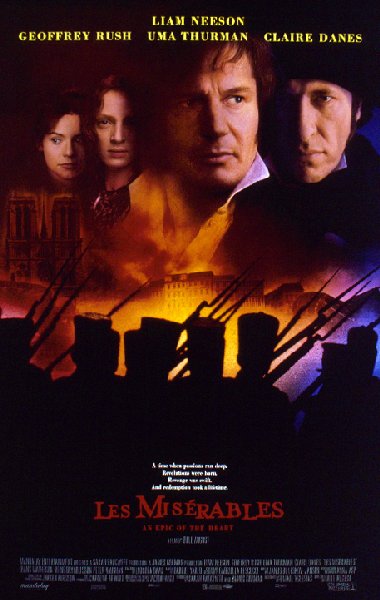Movie Parables: Les Miserables

Loving the Unlovable Among Us
The 1998 film, Les Misérables, translated “the Wretched Poor,” is based on the famous 1862 novel by French author Victor Hugo. The story revolves around an escaped prisoner by the name of Jean Valjean and his experience of redemption. Throughout the film, Valjean is relentlessly hunted down by an unforgiving French investigator who has sworn to capture and return him to prison.
Seeking shelter from the harsh winter, we find him desperately knocking on a door late at night. The home happens to belong to the town bishop who offers Valjean refuge, in spite of the fact that he is a known convict who is wanted by the authorities. The bishop listens to his trying tale and serves him a sumptuous meal. But despite the bishop’s kindness, Valjean returns evil for good. In the middle of the night he remembers the shiny silver spoon he used to eat his soup at dinner and sneaks into the dining room to steal the bishop’s valuable silverware. The bishop is awakened by the loud metal clatter and rises up to inspect his home. He discovers that his houseguest has just robbed him. Valjean strikes the bishop leaving him wounded and unconscious then escapes into the night.
Although the bishop’s wife mourns the loss of their precious silver, the bishop consoles her and says, “So we’ll use wooden spoons. I don’t want to hear anything more about it.” No sooner does he say this when the authorities appear at his home with the stolen silver and a handcuffed and hooded prisoner who happened to be his former houseguest and assailant.
The bishop looks into the thief’s eyes and says, “I’m very angry with you, Jean Valjean.” Turning toward the authorities, he asks, “Didn’t he tell you that he was our guest?” “Oh, yes,” replies the chief constable, “after we searched his knapsack we found all this silver. He claimed that you gave it to him.”
Valjean looks down in shame and awaits the bishop’s verdict that will surely throw him back in prison. But the bishop says, “Yes. Of course I gave him the silverware.” Then, turning to Valjean he asks, “But why didn’t you take the candlesticks? That was very foolish. They’re worth at least two thousand francs. Why did you leave them? Did you forget to take them?”
The bishop signals his wife to hurry and fetch the candlesticks, while the authorities stand there dumbfounded. They ask, “Are you saying he told us the truth?” The bishop replies, “Of course. Thank you for bringing him back. I’m very relieved.” The authorities quickly release Valjean, who is shocked by the sudden turn of events while the bishop places the candlesticks into his knapsack. As soon as the authorities leave, the bishop drops the heavy bag filled with silver at Valjean’s feet. He removes the thief’s hood, which hid his guilty face. The bishop looks him face-to-face and orders him, “Don’t forget—don’t ever forget you’ve promised to become a new man.” Valjean trembled before the bishop, agrees to keep his promise, and asks him, “Why are you doing this?”
The bishop places his hands on Valjean’s shoulders as an act of forgiveness and declares, “Jean Valjean, my brother, you no longer belong to evil. With this silver, I’ve ransomed you from fear and hatred. Now I give you back to God.”
In so doing Valjean experiences a kind act of forgiveness that seems so foreign and long forgotten. The bishop redeems his life and allows him his sought after freedom.
Jesus commands the people of God saying, “Love your enemies, do good to those who hate you, bless those who curse you, pray for those who abuse you. If anyone strikes you on the cheek, offer the other also; and from anyone who takes away your coat do not withhold even your shirt. Give to everyone who begs from you; and if anyone takes away your goods, do not ask for them again. Do to others as you would have them do to you” (Lk 6:27-31).
Les Misérables (Columbia Pictures, 1998), written by Rafael Yglesias (based on the novel Les Misérables by Victor Hugo), directed by Billie August.
© 2009, Gicky Soriano. All rights reserved.
More Movie Parables:
- Movie Parables: Apollo 13
My son and I, caught the Apollo 13 matinee feature in the mid-nineties. The movie was as intense and heart stopping as the critics said it would be. I believe I was just about my son’s age when this... - Movie Parables: Blade Runner
Director Ridley Scott’s 1982 film adaptation of Philip K. Dick’s science fiction novel Do Androids Dream of Electric Sheep? (1968) failed to draw rave reviews from movie critics and audiences alike at its... - Movie Parables: Chariots of Fire
The true story of two British track athletes who compete in the 1924 Paris Summer Olympics was captured in the historic film drama Chariots of Fire. Harold Abrahams, a determined Jewish student, ran for... - Movie Parables: Gods and Generals
Jeffrey M. Shaara’s bestseller, Gods and Generals was made into an epic motion picture that charted the early years of the American Civil War as well as the rise and fall of legendary war hero “Stonewall... - Movie Parables: The Hurt Locker
In the war drama, The Hurt Locker,[i] Staff Sergeant William James is a member of the Armys elite bomb squad unit serving in Iraq. He has one of the most dangerous jobs in the worldto disarm terrorist... - Movie Parables: Major League
Im thinking about Jake Taylor, a baseball catcher playing for the Cleveland Indians in the 1989 film Major League. There was a time when he was one of the best in the game until his knees were shot-out. ... - Movie Parables: The Matrix
In the science-fiction film The Matrix, the real world has been taken over and controlled by the machines. The humans are prevented from knowing the unseen reality of their world. The machines use the minds... - Movie Parables: The Right Stuff
Has your world ever gotten rocked in the worst way? You wake up early one sunny morning, brew your best blend of coffee, and ease into your favorite recliner to read your Bible, the newspaper or a... - Movie Parables: The Thorn Birds
The Thorn Birds is the second most-watched miniseries in television history. This multi-Emmy award winning film epic was set in Drogheda, a sheep station located in the Australian outback between the years...
Recommended reading:




